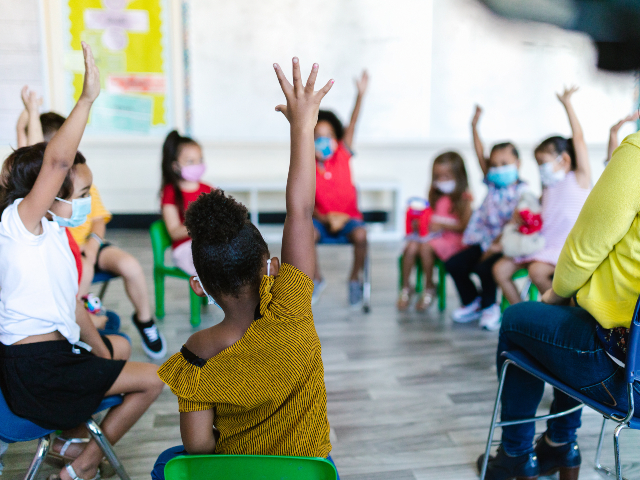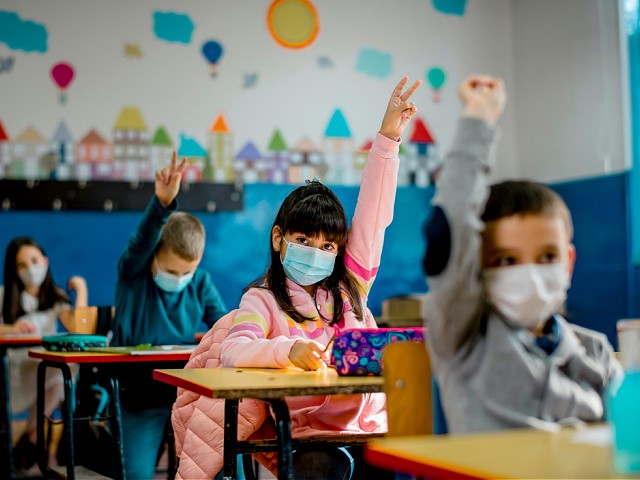Boston Researchers: Universal Masking in Schools Can Counter ‘Structural Racism’
Universal masking may be “an important tool for mitigating the effects of structural racism in schools,” according to a study published in the New England Journal of Medicine (NEJM) claiming the coronavirus pandemic deepened “educational inequities,” disproportionately affecting groups who are “vulnerable by historical and contemporary systems of oppression, including structural racism and settler colonialism.”
The new study released last week, titled “Lifting Universal Masking in Schools — Covid-19 Incidence among Students and Staff,” was conducted by researchers from Harvard University, Boston University, the Boston Public Health Commission, and Massachusetts General Hospital.
The peer-reviewed study explored the aftermath of Massachusetts’ lifting its statewide universal masking policy in public schools in February, with many local school districts subsequently dropping their mask requirements, and only two greater Boston area school districts continuing the requirements through June.
As such, the conditions “provided the means to examine the effect of universal masking policies” on the incidence of COVID in schools by comparing and contrasting those school districts that lifted masking requirements with those that did not.
Results from the study showed that during the nearly four months following the rescinding of the statewide masking policy, ending masking requirements was associated with a very modest increase in cases of coronavirus among students and staff.
New editorial by Julia Raifman, Sc.D., and Tiffany Green, Ph.D.: "Universal Masking Policies in Schools and Who Bears the Costs of Covid-19" https://t.co/vDqiDb4pgq pic.twitter.com/3Ca46omEn0
— NEJM (@NEJM) November 9, 2022
According to the study, “districts that chose to sustain masking requirements longer tended to have school buildings that were older and in worse condition and to have more students per classroom than districts that chose to lift masking requirements earlier.”
Furthermore, the study claims, those same districts “had higher percentages of low-income students, students with disabilities, and students who were English-language learners, as well as higher percentages of Black and Latinx students and staff.”
In addition to supporting universal masking “as an important strategy” for reducing coronavirus incidence in schools, the paper asserts that such a policy may also help reduce the effects of “structural racism” in schools, though it remains unclear just how.
Accordingly, the pandemic was responsible for deepening “educational inequities,” whose effects have been “disproportionately borne by groups already made vulnerable by historical and contemporary systems of oppression, including structural racism and settler colonialism.”
“Black, Latinx, and Indigenous children and adolescents are more likely to have had severe Covid-19, to have had a parent or caregiver die from Covid-19, and to be affected by worsening mental health and by educational disruptions than their White counterparts,” the paper reads.
The researchers posited that even prior to the coronavirus pandemic, “chronic underinvestment” in schools, along with “structural racism codified in state-sanctioned historical and contemporary policies and practices (e.g., redlining, exclusionary zoning, disinvestment, and gentrification),” had “eroded tax bases in some school districts and shaped the quality of public school infrastructure and associated environmental hazards.”
“These processes left school districts differentially equipped to respond to the Covid-19 pandemic and concentrated high-risk conditions, such as crowded classrooms and poor indoor air quality due to outdated or absent ventilation or filtration systems, in low-income and Black, Latinx, and Indigenous communities,” the paper states.
Understanding coronavirus policy decisions, it argues, “requires attention to power and existing historical and sociopolitical contexts.”
Furthermore, it continues, “structural racism and racial capitalism operate through multiple pathways, including higher levels of household crowding and employment in essential industries and lower levels of access to testing, vaccines, and treatment.”
Those school districts that chose to maintain masking requirements longer, the researchers write, “tended to have school buildings in worse physical condition and more students per classroom, and these districts had higher percentages of students and staff already made vulnerable by historical and contemporary systems of oppression (e.g., racism, capitalism, xenophobia, and ableism).”
As a result, the researchers suggest that the “decision in some school districts to sustain school masking policies longer may therefore reflect an understanding among parents and elected officials that structural racism is embedded in public policies and that policy decisions have the potential to rectify or reproduce health inequities.”
This is not the first time masking policies have been associated with racism.
In April, NAACP Legal Defense Fund director-counsel Janai Nelson said that Middle District of Florida U.S. Judge Kimball Mizelle’s ruling against public transportation requiring passengers to mask is “reckless” and has “racial impacts that are preventable and avoidable.”
Source: Breitbart








